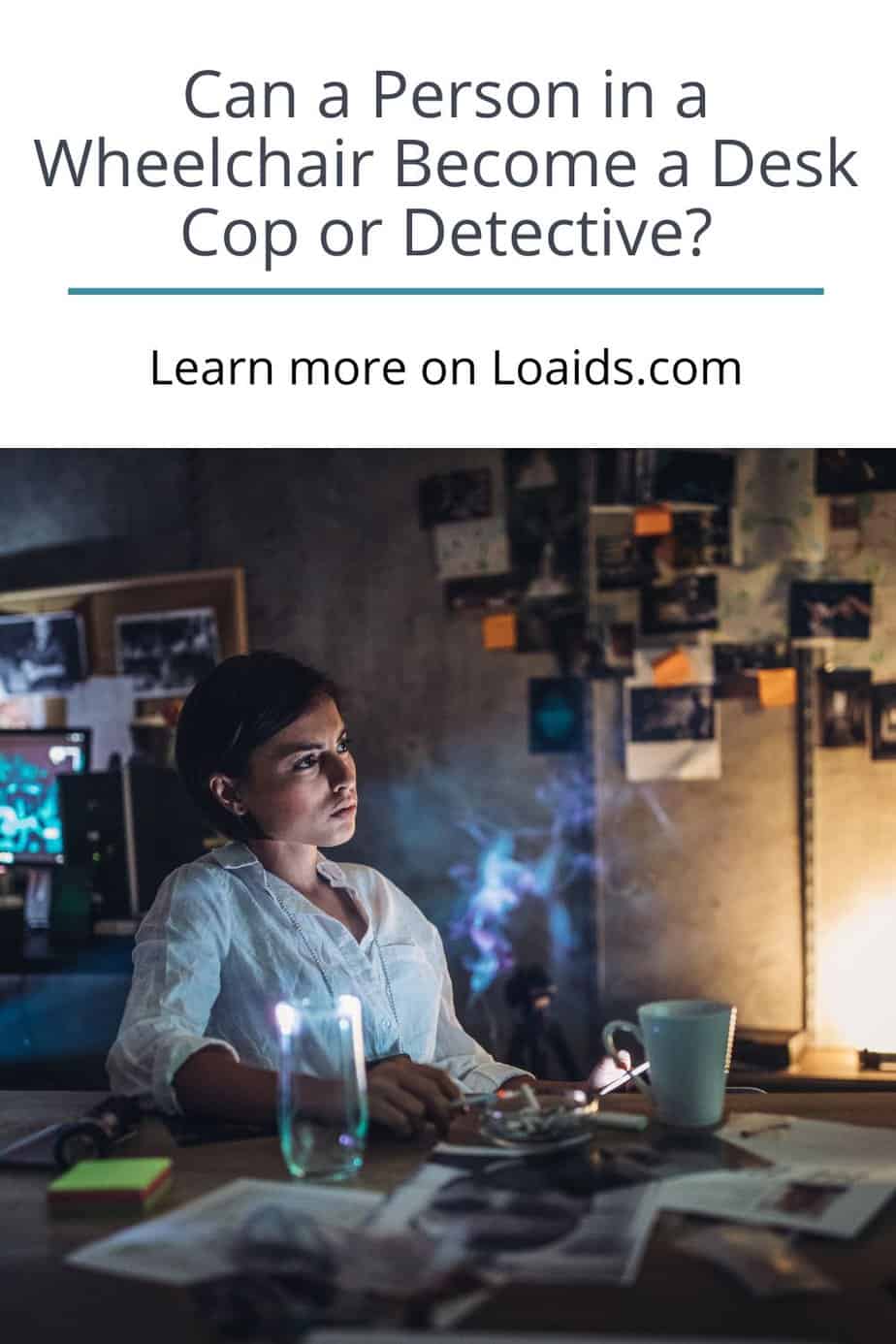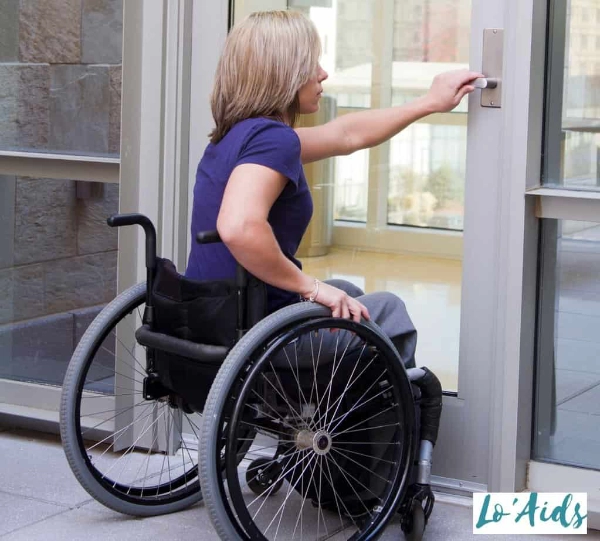So, can a person in a wheelchair become a desk cop or a detective? Yes, wheelchair users can be desk cops or detectives in a police department.
I recently visited the local police department and was surprised to find a desk cop also in a wheelchair.
If you also didn’t know that someone with a mobility disability could be in the U.S. Department of Justice, keep reading to find out more!
Table of Contents
Can a Person in a Wheelchair Become a Desk Cop or Detective?
Yes, individuals with mobility disabilities can take on a desk cop or a detective post in law enforcement agencies.
These jobs differ from what other employees without disabilities or police officers do to protect people.
To be a qualified person, you must pass the minimum requirements of the Americans with Disabilities Act and the public entity.
Becoming a desk cop or detective also requires proper law enforcement training. So qualified individuals who have worked with the force usually take these posts.
You must do the essential job functions efficiently, with or without reasonable accommodations.
Also, note that the U.S. Department of Justice reserves the right to select any eligible individual for the position.
Be sure to explore our other article, including “Can a Disabled Person Join the Military?” for comprehensive information on this topic.
Basic Requirements To Join a Police Department
The law enforcement agencies’ application process usually varies with the specific state. The Commission on Peace Officer Standards and Training (POST) sets the requirements. (1)
Here are the basic requirements needed to join the police department.
1. Citizenship
You must be a U.S. citizen to serve in the police. Alien residents are also eligible to join the public service, with some agencies requiring you to live within their jurisdiction.
2. Education
The minimum academic requirement is a GED or a high school diploma. But some law enforcement agencies need a set number of college credit hours or a bachelor’s degree.
A degree in law enforcement boosts promotions and special assignments chances. Apart from criminal justice studies, other studies warranting opportunities include social work, psychology, and sociology.
3. Age
Most agencies begin the hiring process of qualified individuals with 21 years of age. Some hire cadets as young as 18 years old from the law enforcement academy.
The age limit varies from one agency to the other. So you can join some of the U.S. Department of Justice agencies even at 30.
4. A Driver’s License
Most graduates start the public service job in patrols. So, you should have a valid driver’s license to operate a police vehicle.
Also, note that the agency does background checks to determine your conduct. These checks happen before training, and any misdemeanors can quickly disqualify you. (2)
5. Fitness
An officer’s fitness level is crucial to their safety and others. You will undergo physical training and medical examinations to show that you can fit the job description without undue hardship.
Different agencies have different test procedures and medical examination standards. So it is better to prepare to guarantee success, even if the agency uses alternative formats for the tests.
Disqualifying Impairments
The hiring process is usually thorough, and individuals with disabilities will have many challenges. According to CHRON, any impairment limiting your ability to achieve major life activities is a disqualifier. (3)
Here are some of the disqualifiers:
- An agency can disqualify a blind or deaf person if medical procedures cannot correct their condition.
- A paralyzed or amputated person is disqualified if a prosthesis cannot help.
- Mental illness.
Jobs in the Police Department for Wheelchair Users
While people with disabilities have a slim chance of becoming police officers, the U.S. Department of Justice is vast. Here are three careers private individuals can check out.
1. Community Service Officers
A community service officer handles calls for service where the situation poses no direct threat or substantial harm to the emergency personnel.
You will respond to traffic issues like accidents or cold burglaries and reports from public accommodation places.
You will carry out your business days unarmed and use non-lethal protection accessories like pepper spray. Here is a video explaining what a community service officer does.
2. Telecommunicator/Dispatcher
A telecommunicator works within an agency’s radio department to answer 9-1-1 calls for service. You will usually work alongside a radio operator to record crucial call details.
As a dispatcher, you must organize emergency services and police vehicles to reach the caller on time.
Note that you may have to undergo specialized training to help you guide the caller in case they need emergency services.
Here is a video explaining what this emergency personnel does.
3. Probation and Parole Officers
Parole and probation officers work closely with offenders to correct their conduct after conviction. The two officers differ in job functions. A parole officer works with a client who has served jail time.
The officer typically meets with the client during normal business hours, reviews the parole conditions, and can resend the client to prison in case of violation. Here is a video showing the life of a parole officer.
On the other hand, a probation officer works with an individual who has not served jail time. A judge usually convicts the offender and specifies probation measures to follow.
As the probation officer, you ensure the client follows conditions, and you can re-arrest them if in violation. Here is a video on what probation officers do.
FAQs
1. Would a police officer who is injured on duty continue doing their job?
Yes, a police officer injured in the line of duty can do other technical assistance tasks within the agency. But the officer must show the ability to handle the task given without undue hardship.
2. Can you join the police in a wheelchair?
No, people with disabilities cannot join the police force because they can pose a direct threat to others’ safety. But there are other career opportunities for individuals with disabilities.
Conclusion
Becoming a part of a law enforcement agency requires you to be physically and mentally fit.
So, can a person in a wheelchair become a desk cop or detective? Yes, since the ADA advocates for non-discrimination against individuals with disabilities, you can still join the non-sworn roles.
A cop injured in the line of duty can continue working within the department if they can perform the essential functions.
So if you want to work in the U.S. Department of Justice, go for it!

References
1. POST. About Us [Internet]. post.ca.gov. [cited 2022 Sep 13]. Available from: https://post.ca.gov/about-us#:~:text=The%20Commission%20on%20Peace%20Officer
2. All You Need to Know About Police Background Check and Disqualifiers [Internet]. Largest Listing of Law Enforcement Jobs. 2017. Available from: https://golawenforcement.com/articles/need-know-police-background-check-common-disqualifiers/
3. Timmons B. Can I Be a Cop if I Have a Physical Impairment? [Internet]. Work – Chron.com. [cited 2022 Sep 13]. Available from: https://work.chron.com/can-cop-physical-impairment-23164.html





